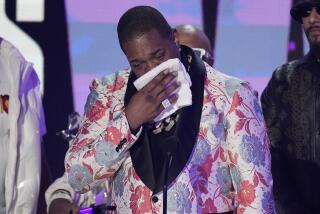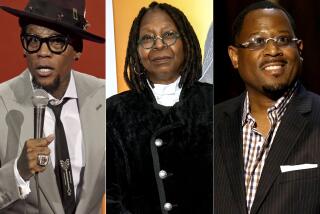Why Was BET Left Out of UPN Equation?
- Share via
Long ago I had a girlfriend who often said, “Don’t ask questions unless you’re sure you want to know the answers.” The intimation was that the truth, although it may set you free, may also bring to light other, more disturbing, issues that now must be addressed. (Actually, I think that she was just hinting at the fact that she was also seeing another man in my apartment building, but her point was made.)
Brian Lowry and Greg Braxton asked the question, “If UPN Goes Under, What Happens to Its Programs?” (Aug. 21). The answer in their story was that there most likely will not be a home for some of the favorite shows of African American audiences if UPN doesn’t survive. Yet asking this question raises more disturbing questions whose answers may be equally disturbing.
It’s disturbing because the only suggested possible home for any of these quality African American-targeted shows on UPN was the WB network.
It doesn’t bother me that ABC, CBS, NBC and Fox wouldn’t want African American shows that cater to a specific audience that is the direct opposite of the viewers who watch shows like “Friends,” “Frasier” or “Family Guy.” It doesn’t bother me because this unfortunately is par for this exclusive country club course. The nature of these beasts is not unfamiliar to anyone in the African American community. We’ve been excluded from country clubs before.
What deeply troubles me is the fact that the BET (Black Entertainment Television) cable network, which has been in existence for 20 years, was not even mentioned as a possible lifeboat for any of these shows. Was it an oversight on the part of Lowry and Braxton or an irrefutable acknowledgment that BET is an inadequate venue in which to sustain viable and legitimate African American interest in TV programming . . . even 20 years after inception? I suspect it’s the latter.
Yes, I’m going there. . . . What about this network whose slogan is “Black Star Power”?
The question is now asked, but is the answer more than what we in the African American community are ready to hear and then address?
When I did a project study on the programming content at Washington-based BET when I was a senior at Georgetown University in 1991, the network’s lineup was primarily video shows. Fast-forward almost 10 years: While the video music content has somewhat decreased, the only scripted entertainment series available take the form of defunct shows such as “Sparks,” “Good News” and “Amen.”
To BET’s credit, it would be unfair not to acknowledge the quality programs such as “BET Tonight With Tavis Smiley” and “Teen Summit” that do a great service in enlightening the adult and youth communities, respectively, on all contemporary issues. Both of these shows are legitimate weapons to battle ignorance and indifference. The programs are insightful, informative and are exemplary of the true potential of positive African American-centered programming. And the Arabesque movie series gives African American directors and screenwriters a platform unavailable anywhere else. Three steps forward.
Yet this cannot obfuscate the tangible and pervasive programming inadequacies the other 97% of the time BET is on the air. Ninety-seven steps back.
Why is this still the case?
Is it money? The privately held network’s founder and chief executive, Robert L. Johnson, controls a media empire worth an estimated $2 billion and is trying to start his own airline. This is a momentous achievement, but it discredits the notion that BET is financially strapped. I’m guessing that the rights to UPN’s “The Parkers” (the most watched show in African American homes) would not usher the network into utter fiscal insolvency.
Is it not “time” yet? It’s been 20 years; how much time is needed?
Is it racism on the part of cable operators and advertisers who haven’t supported the network as well as they might? Possibly, but that doesn’t absolve BET of its own responsibility.
Is it hypocrisy? The question needs to be asked. BET in theory was created as a venue to showcase African American talent and address African American issues for the African American community. It was to fill a void that existed in 1980 on the Big Three network and that, disappointingly, still exists today on the Big Four.
If BET is still ill-equipped after 20 years to provide a lifeboat for shows on UPN that may otherwise die, shouldn’t we be wondering if BET is doing more of a disservice than providing a cable channel service?
This question needs to be asked. We have a responsibility to ask it. But are we ready for the answer?
*
Counterpunch is a weekly feature designed to let readers respond to reviews or stories about entertainment and the arts. Please send proposals to: Counterpunch, Calendar, Los Angeles Times, 202 W. 1st St., Los Angeles, CA 90012. Or fax: (213) 237-7630. Or e-mail: C[email protected]. Important: Include full name, address and phone number. Please do not exceed 600 words. We appreciate all proposals and regret that we cannot respond to each.
More to Read
The complete guide to home viewing
Get Screen Gab for everything about the TV shows and streaming movies everyone’s talking about.
You may occasionally receive promotional content from the Los Angeles Times.






